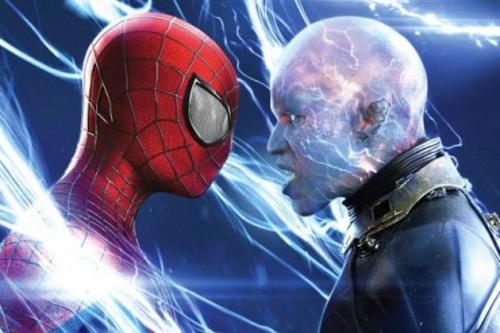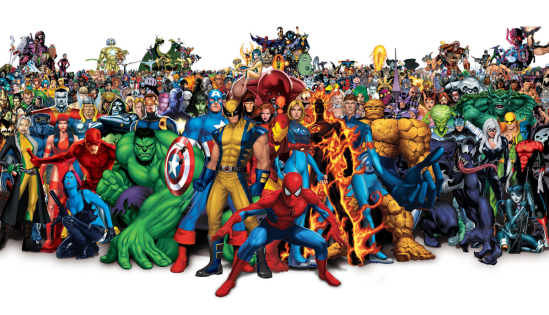
I walked into the theater for ‘The Amazing Spider-Man 2,’ which was released earlier this month, with the assumption that I’d be entertained by an action-packed storyline and young, attractive actors. What I did not expect was a distasteful portrayal of mental health facilities and mental health issues in such a popular film.
“Ravencroft Institute for the Criminally Insane,” read the distinct lettering on a building that appears about half-way through the movie. This institute is a facility for individuals with mental illnesses, who also just so happened to be lawbreakers or villains. While this center exists in the Marvel Universe, and has thus been part of the comic series, there is still something distinctly wrong with naming an institution in this manner. This picture has been painted before, so it isn’t a novel idea unique to this film or Marvel Comics.
Over the course of history, society has found a way to equate men and women living with mental illnesses as “insane” and violent criminals. This understanding perpetuates the idea that such illnesses serve as explanations for why these individuals are felons. It feeds the mentality that criminals are mentally ill and are the “untouchables” in our society. Why else would our society support institutionalization and isolation of those living with mental illnesses, rather than put resources for these individuals into rehabilitation and reintegration into the community?
The film also introduces several characters living with mental illnesses, including the protagonist. Peter Parker/Spider-Man (played by Andrew Garfield) encounters hallucinations brought on by PTSD. Harry Osborn (Dane DeHaan) displays severe problems with abandonment. And Max Dillon/Electro (Jamie Foxx) lives with an attachment disorder, which is demonstrated in his ever-changing mood and behavior throughout the film. With the inclusion of these mental illnesses in the film, ‘The Amazing Spider-Man 2’ creators had the ability to open up dialogue on mental health in a constructive way. Unfortunately, the opposite occurred. According to Melissa Brooks:
“… the film condemns the person with the illness, rather than exploring the systemic problems it initially introduces.”


There is something extremely wrong with the narratives presented in ‘The Amazing Spider-Man 2.’ While these stereotypes associated with mental health have been around for some time, I found myself rather disappointed with the creators of this much-anticipated summer blockbuster.
Today’s media and pop culture ultimately feed public opinion. Regardless of whether or not our news sources are actually forms of yellow journalism, the general public tends to turn fiction into fact. With regards to superhero films, the target audience ranges from young children to adults. Images that are seen in these types of films become influential to those watching the films. These images are the most harmful to younger viewers, as these kids go on to live their lives, having being exposed to stories where a mental facility is the rightful place for a “crazy person.” Furthermore, in the news, mass shootings are attributed to mental illness rather than other factors, including our failed mental health care system and concern over gun laws. Thus, individuals committing crimes are repeatedly defined by their mental health issues. Those living with mental illnesses or health concerns become the population within our community that is ignored, criminalized and mistrusted. This is the understanding that our nation’s youth is growing up with. This is what our society subjects future generations to.
Whether or not it was the intention of the writers and filmmakers to misrepresent the mental health community in an irresponsible manner, they ultimately failed to conduct proper research before including such a sensitive matter in the film. Movies, especially those part of popular franchises, have the ability – intentional or unintentional – to influence the masses.
‘The Amazing Spider-Man 2’ creators could have presented a wiser and more educated understanding on mental health, especially since this health concern has a growing presence in the media. In fact, May is also ‘Mental Health Month,’ and this year’s theme is “Mind Your Health.” Instead, the film does not contribute to a positive dialogue, but perpetuates the stigmas and taboos associated with mental health.

This isn’t a matter of being PC. This is a matter of holding our society accountable in promoting appropriate portrayal of mental health facilities and mental illness. The more that negative stories and images of mental health are featured in the news, television, movies and other forms of media, the less of a chance we have at changing this narrative.
There are several misconceptions associated with mental illness and mental health. We may not be able to control what is being presented in the media, but we can start by educating ourselves. We should inform our families, friends and networks by starting a dialogue. And for those with families and children, we should be mindful of what we expose our children to, and be proactive in restructuring the narrative for future generations. We can speak up and join campaigns and initiatives that help continue the conversation. In time, we can shift our perspective and cultural understanding of those who have become subjected to social othering purely on the basis of mental health.

Interesting, interesting. This kind of stuff always reminds me of that interview with Glenn Close when she was talking about how she was disappointed by the way the director of the thriller? movie she was in decided to change the ending of the movie (in such a way that portrayed her mentally ill character as a villain that needed to be shot and killed).
In my opinion most criminals commit crimes as a results of some kind of mental illness, but I agree–I think society treats that as a be-all, end-all. Like, oh, he did that because he was crazy. Crazy man! All those crazies should be all put in a loony bin! But that kind of mentality should be stopped, or continue with the thought “What can we do to prevent this from happening?” which would be more productive.
And the fact that this message is being sent to folks that might be struggling unawares with a mental illness. That they might think that their illness makes them a hopeless case, or a criminal, and that they might as well be criminals or dead or in a loony bin or just not contributing to society. The self-fulfilling prophecy could be dangerous to themselves and others. Which is a shame because many people that live with a serious mental illness have huge potential to contribute to society (e.g. my mom works with like, a genius anaethesiologist who has schizophrenia).
And I think of the fact that it’s these money-making, star-studded blockbusters that are playing in countries around the world, countries that are still developing and/or have very primitive knowledge about mental health and treatment. It certainly doesn’t help to improve attitudes towards mental health and developing an effective mental health care system. (Don’t even get me started on mental health and Mongolia…!)
LikeLiked by 1 person
Kristine Mo.,
Your comment about Glenn Close’s character is very interesting. That’s definitely something I would agree with; why are characters living with mental illnesses discriminated against and characterized as villains? It’s also interesting that you bring this up, as Glenn Close is actually a well-known advocate of mental health. With Bring Change 2 Mind, she works to eradicate the stigma associated with mental illness.
The mentality that you mention is definitely perpetuated by what is seen in the media. I would agree with you that more preventative action needs to be taken, not reactive.
Thank you so much for sharing your thoughts!
LikeLike
I have a lot of mixed feelings about this. I haven’t seen Spiderman 2, so I can’t speak to that movie, but I read a lot of comics and graphic novels, and I feel that many of the characters have such depth and resonance precisely because of psychological disturbances, and to take that away from their characters would remove the impact and drama of the story. You might be interested in sources such as this: http://www.amazon.com/The-Psychology-Superheroes-Unauthorized-Exploration/dp/1933771313 for more insight into the psychology of pop culture.
I also disagree with the juxtaposition of watching superhero films and prevalence of mass shootings.
How would you have preferred to see the movie portrayed?
LikeLiked by 1 person
Amanda,
Thanks for sharing your thoughts. To be honest, I don’t think removing characters who live with mental health illnesses would be the answer. Rather, I think the way that these characters were framed contribute to society’s negative perception and understanding of mental health. While it was all based upon Marvel Comics, the fact that Jamie Foxx’s character was almost immediately categorized as “criminally insane” creates the message that if you’re living with a psychological disorder, you can be perceived as both a “criminal” and an “insane” person. When Dane DeHaan’s character is introduced, it’s as though he too is put into this category. I really found this aspect of the movie to be a form of othering, making these characters as the untouchables in the film and in society in general. Personally, if I found myself identifying with either of these characters (perhaps I experience the same emotions and have the same thoughts as them), I might feel victimized by these assumptions. Perhaps I would automatically categorize myself as “insanse,” and for fear of being perceived as an untouchable, I would not speak up about my personal struggle.
Spider-Man (played by Andrew Garfield) is a character known for his inner-conflict stemming from past experiences; the characteristics he displays do add necessary depth and complexities to the overall plot. However, because he is the protagonist, he isn’t really put in the same category as the villains. Granted, it’s a movie, and it primarily functions as a form of entertainment. I don’t expect for all future films that portray mental illness to change the way they present their characters.
However, I would argue that as mental health becomes more a buzzword/topic (whether it’s from superhero films or the occurrence of mass shootings), our society has the responsibility to move the conversation even further. This responsibility extends to everyone, including influential filmmakers in Hollywood. This conversation can grow by raising awareness, educating the greater public on the issues and providing more positive and effective solutions/resources for those who do experience mental health concerns. I believe this type of dialogue (in which mental illnesses aren’t always introduced in a negative light) is important, especially if people find themselves relating to characters they see in movies or individuals portrayed in the news.
LikeLike